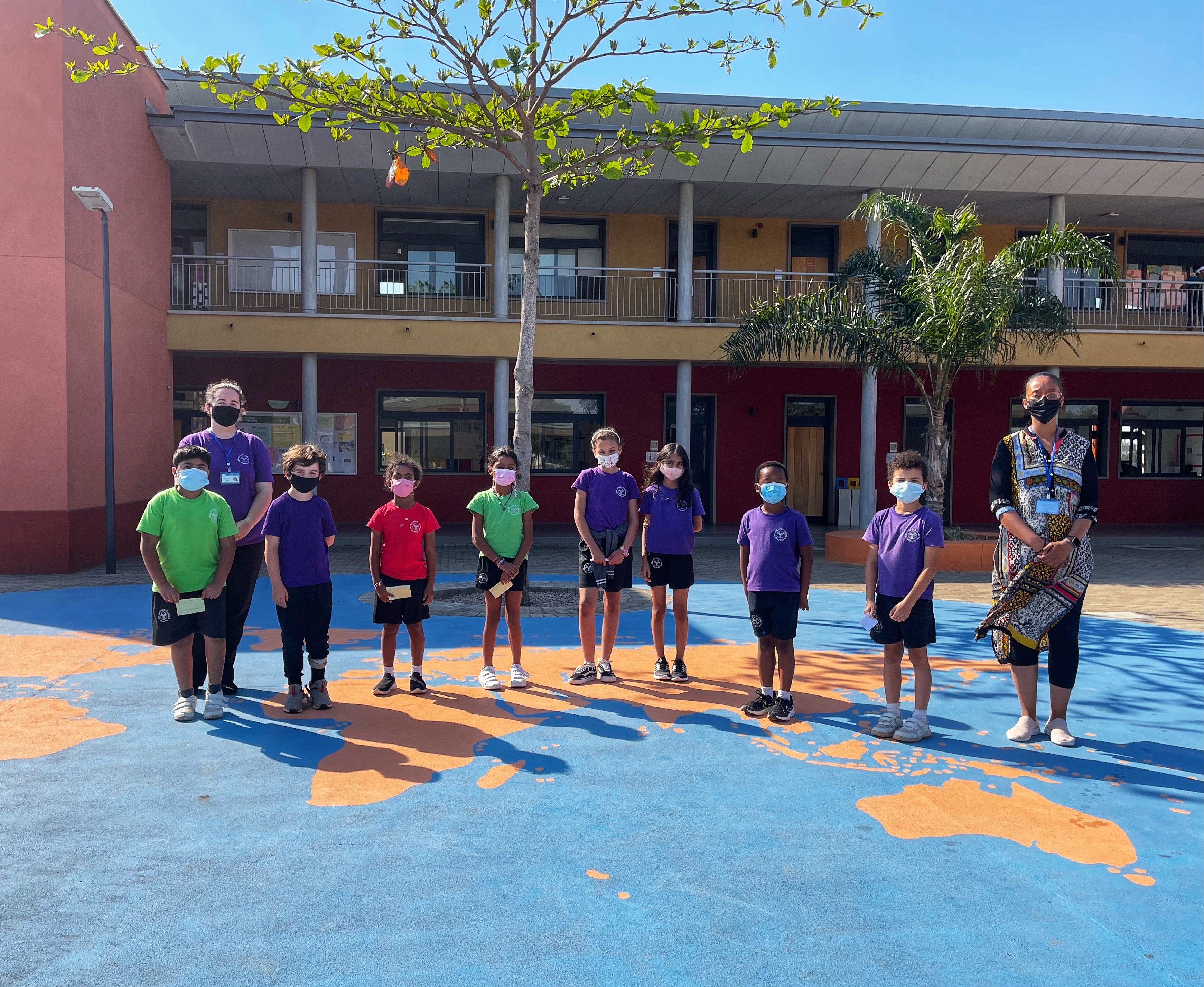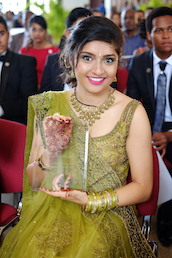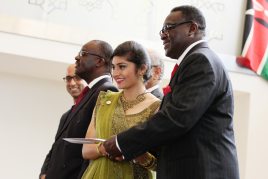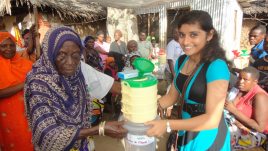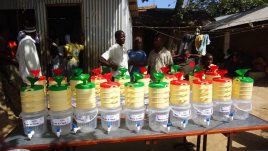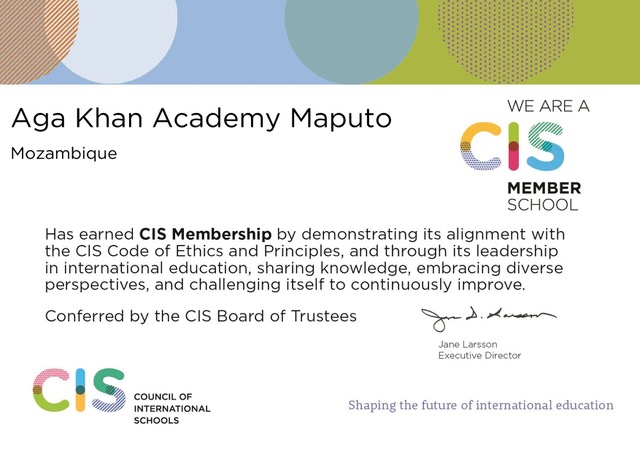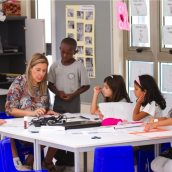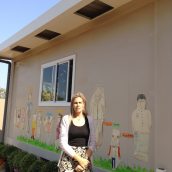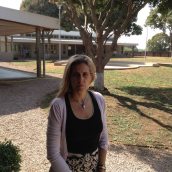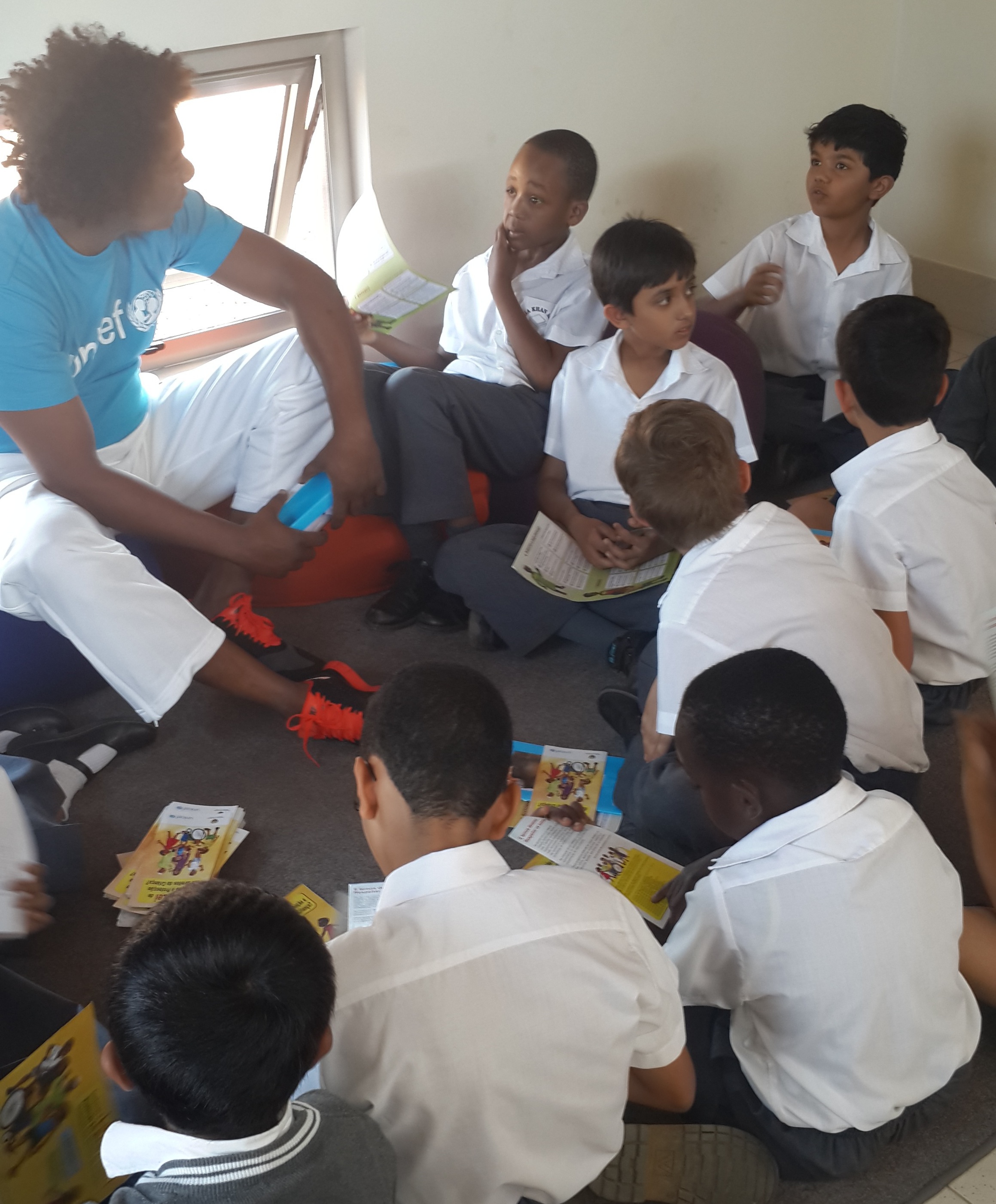Parent - Student -Teacher Conferences/Conferências Pais-Alunos e Professores
Friday June 8 2018.
Retreat for the Student’s Representative Council
Karishma Bhagani (Class of 2015): Making a splash for clean water
Look below for a video of Karishma speaking at the Passion in Science Awards.
Last year, 20-year-old Karishma Bhagani of Mombasa, Kenya was awarded a seed grant at the NYU Reynolds Changemaker Challenge, beating out eight other teams and 46 other projects. Bhagani won the seed grant for an innovative water purification system that makes the most of natural resources in cash-strapped communities that need clean water. Her initiative, Matone De Chiwit, came about as a solution to a problem she noticed: more and more diseases were emerging as a result of fluctuating weather in the country, ranging from floods to drought conditions. She knew that something had to be done.
Matone De Chiwit means “drops of life” in three different languages. Matone means drops in Kiswahili (Kenya), de means “of” in Spanish (Latin America) and chiwit means “Life” in Thai (Thailand). These three languages represent the three parts of the world that suffer the most from clean water scarcity. It also speaks to the global nature of her venture, as Bhagani intends to expand her project to these three regions and beyond.
Aga Khan Academy as an Inspiration
Bhagani is a fourth-generation Kenyan who recently moved to New York City where she is studying drama, history and South Asian studies at New York University. The Aga Khan Development Network has always been a part of her life as she was one of 17 students at the Aga Khan Academy in Mombasa who made up the first class to have been educated from pre-school to IB graduate.
The biggest lesson that Bhagani drew from her education is to be a holistic student. She strives to be as well rounded as possible, striking a balance between a social life, sleep, work and school, all with the goal of making a global impact. This pursuit of balance was inspired by her many years at the Aga Khan Academy.
“I think that at the end of the day what everything comes down to is how we can be citizens of the world and how we can change the world that we live in to make it a better place for ourselves and children that follow us. And part of that also means giving back to your own community,” said Bhagani.
When she was in middle school, she was required to carry out a personal project on something that inspired her. Having noticed the drastic fluctuations of weather and rampant diseases in her country, Bhagani decided that she would come up with an innovative water purification system that uses readily accessible natural resources. Her initiative uses locally available materials – sand, gravel, charcoal and cotton cloth – to purify water for villagers all across Kenya. The initial version of the product also used chlorine tablets called Aquapur. Bhagani received generous sponsorship funding from Davis & Shirtliff, a local water supply company, for donating 20 units to a community to test for effectiveness. “A lot of the families said that the water was ‘tamu sana’ which in English means very sweet,” said Bhagani.
Before Bhagani came up with her product, local families were typically just drinking untreated water, using a lot of energy to boil it on charcoal-heated stoves or using Aquapur chlorine tablets.
Testing and Improving
Through testing and implementation in villages, Bhagani and her partners came to the realization that using chlorine in a plastic container might not be the best idea. These tablets can actually be dangerous to human health — high doses can be potentially harmful as the plastic in the bottles reacts with the chlorine, resulting in the spread of more serious illnesses. So they decided to change it to moringa oleifera, essentially dried seed kernels of drumstick tree powder. Then, she carried out a lot of testing by collaborating with the Coast Water Services Board. She found that the new version worked just as well as the chlorine unit did.
When she was in the IB program at the Academy, she had the opportunity to take her unit to the Golden Climate International Environment Project Olympiad. That’s where she carried out even more research and testing to modify and improve the system. Her project ended up advancing to the national round, then the international round, where she won gold in its category.
It was at this point that she decided to patent the product. She applied before starting at NYU and received the patent while she was a first-year student.
Why Matone De Chiwit?
What sets Matone De Chiwit apart from competitors is that the device is both chlorine-free and cost-effective. Since it’s made up of natural resources common in rural Kenya and other parts of Africa, they can be replaced easily, which means users don’t have to rely on Matone De Chiwit to replenish the filter. Charcoal is easily found and other ingredients, like the drumstick tree powder, can be grown in their backyards. Additionally, Moringa olifeira grows in a variety of climates and doesn’t need much water to grow.
In terms of cost, it’s much cheaper in the long-term than what is currently used. Even so, Bhagani intends to ensure it’s affordable for rural villages by applying for sponsorship and grant funding from large companies all over Europe and North America. Her venture is also bridging the gap from the city to the village, because she is working with people from each of those communities and bringing them together to achieve clean water and sanitation for all.
The Future
With the seed grants that Bhagani recently received, including the Reynolds grant, she plans to carry out her first beta testing. The biggest challenge for her at the moment is having an adequate source of funding to collect data.
“It’s kind of a chicken-and-egg situation because we need more evidence of this product working in practicality in communities so that we can apply for more grants to sustain us, but without the grants it’s difficult to go out into the communities to actually grow these projects with that seed money,” said Bhagani.
With the little funding that she currently has received, she plans to establish the purifiers in at least two or three communities. Bhagani will continue checking on the units to get enough data so she can apply for larger grants and potentially work with philanthropies like the Gates Foundation. She also hopes to conduct more research on its effectiveness through beta testing in communities.
“In five years’ time, I hope to have conducted at least ten beta tests in Mombasa, and have expanded the venture all across Kenya. My intention is to begin applying for larger grants by that time so that we can expand to other countries around the world,” said Bhagani.
Additionally, she plans to collaborate with other Aga Khan academies in Hyderabad, India and Maputo, Mozambique. That collaboration could build on student organizations that can work with the rural communities that they already engage with.
Her long-term plan is to create a sustainable community, which not only bridges the urban/rural divide but also allows families to provide for themselves.
This spotlight is republished courtesy of AKF USA.
Sandra Marise de Abreu Antunes: Motivating Students to Dream Big
“Teaching for me is to inspire students to build beautiful and magnificent magical castles. To me this is being a teacher,” she says enthusiastically.
For the two years that she has been at the Aga Khan Academy in Maputo, Mozambique, Sandra has focused her efforts on building a sense of cohesiveness, a sense of belonging in her classroom where her students feel safe to express their imaginings, their ideas and their thoughts.
“I always encourage my students to play together and share. In the classrooms, I take advantage of all the walls, to turn them into walls that speak, that reflect learning. Students' works are also displayed on these walls. These walls reflect colour and joy!”
Born in Angola and educated in her ancestral country of Portugal, Sandra holds a degree in teaching and a postgraduate degree in Information and Communication Technologies. In addition, she has more than 20 years of experience teaching at various schools in Portugal and Angola. She also worked as a Coordinator of School Libraries in Sao João da Madeira in Portugal, for which she received an award from the country’s Ministry of Education.
Asked who it was who influenced her in her journey toward teaching, Sandra does not waver in her response.
“It was my mom,” she says decisively. “I think what influenced me to go into teaching was the fact that my mom always encouraged me to pursue this career. At the time when she was young, she could not study because her father did not let her. She dearly wanted to be a teacher.”
What drew Sandra to apply to teach at the Academy? She says it is the serious commitment the school has towards its students and teachers alike and the lofty goals it has set for itself. She particularly values the emphasis the Academy places on the professional development of its teachers.“For me it is with great honour and pride that I teach at the Academy. I believe in the vision of His Highness the Aga Khan and the honourable purpose of the Academies. Another trait that is distinctive to the school is its teacher education/development programme. It is dynamic.”
Sandra also feels that the Academies’ adoption of the International Baccalaureate (IB) programme was an “excellent choice” because of its unique educational approach. Although the IB curriculum was a challenge to her initially, she enjoyed the challenge.
Sandra is careful to inculcate various strands of the Academy’s curriculum in her teaching, including diversity.
“In my classes I always try to adopt strategies and measures that promote respect, and acceptance of the differences of all of the students. The teacher who builds an environment that upholds equality in the classroom is a reflective teacher.”
“I am committed to the multicultural approach to ensure the highest sensitivity to diversity. It is essential that teachers understand students and their families from different regions of the country and even from abroad, so that they can respect the diversity of languages, behaviours, religions and ways of life, and be able to manage conflicts. In my classes I always give the students real‐world experience so that students develop empathy and tolerance.”
To Sandra, “trust, friendship, solidarity and mutual respect” are of paramount importance in a teacher-student relationship. To build this kind of relationship requires hard work, she says.
“For me being a teacher is not a simple task, rather it is a task that requires love and skill. In my view, the teacher is not simply one who transmits knowledge. The teacher's role is much broader. It surpasses mere transmission of knowledge.”In addition to teaching at the school, Sandra is also involved with the Mozambique Professional Development Center (PDC), an outreach component of the Academy. A major objective of the PDC is to provide high quality professional development programmes for local teachers and pedagogical leaders from a network of selected primary schools in the country. Along with other external facilitators, Sandra is currently aiding in the Early Reading and Writing course. The other two PDC programmes include a Certificate Course in Educational Leadership and Management and Early Numeracy and Geometry.
Reflecting on her time at the Academy, Sandra states that all her days at the Academy are “pleasurable.” However, the one day that will always remain her memory was the time she visited the Academy site while it was still under construction. She felt a sense of belonging, a sense of connectedness then, she states.
By Perviz Walji
For newsletter readers, click here to return to the newsletter
